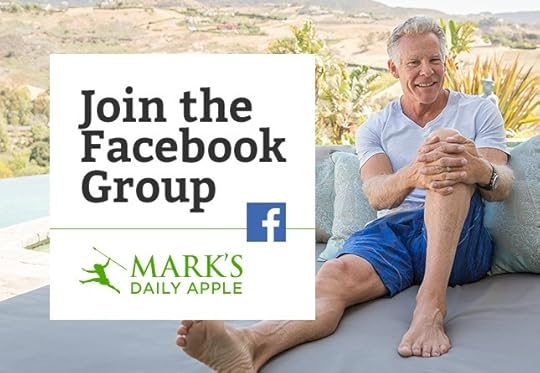Mark Sisson's Blog, page 161
December 4, 2017
A New Chapter For the MDA Forum Community (With a Giveaway)
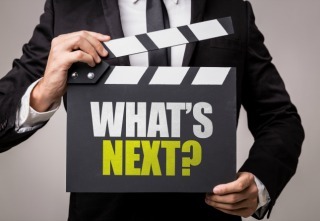 When I first began this blog more than a decade ago, I was adamant about the role of a community with it.
When I first began this blog more than a decade ago, I was adamant about the role of a community with it.
Sure, I wanted to share the knowledge I’d gained (and the experiments I was trying), but I also wanted something more to the experience. I wanted a healthy comment board that encouraged rigorous discussion on blog topics. And I wanted a separate forum (aside from the blog with its comment sections) to foster camaraderie and support among readers.
It was critical, I believed, for folks to be able to talk with each other, to ask questions, and to share ideas for what was on their minds and not just on the blog that day. So, my team and I made it happen. The MDA Forum was born. It flourished, in fact. It became, in its own way, a hub of information within the Primal circle for sure, and even within the emerging ancestral movement.
But today it’s time for a new chapter.
It’s no secret the forum (a separate entity but associated with the Mark’s Daily Apple blog and website) has been plagued by serious technical issues since last fall, and I’m not going to mince words here. I know many of you have shared your concerns on the forum itself, on the comment boards, and in private emails to me. I appreciate those messages—and especially the generous offers to to help with community moderation. If only it had been an issue of simple Grokpower…
Those messages and suggestions haven’t fallen on deaf ears. I’ve heard them. My team has heard them and tried several solutions to the issues over the last year, applying considerable time and expense. While we were able to make some headway at times, it seemed progress would quickly be replaced by additional problems. Unfortunately, the forum as we’d built it—and customized it (the operative point from an IT perspective) over the last ten years—had become virtually unmanageable and unconducive to essential updates.
What to do next was a complicated decision, which is why it’s taken this long to be honest. My team and I wanted to explore every avenue and resource for keeping the existing forum but eventually found this wasn’t going to be a reasonable option.
So, we needed a new direction. While the Primal Blueprint philosophy and community aren’t the small, fringe elements they were a decade ago, I wasn’t willing to forgo a community hub. That’s what MDA was founded on, after all, and this wasn’t going to change. What could the next phase be—and how could it intersect with the tools, developments and supports we’ve put together since? Ten years ago we didn’t have a 21-Day Vimify app. We didn’t have Primal Health Coaches. We didn’t have a Keto Reset Group—or anything beyond the bare bones of social media for that matter (since most channels were in their infancy or didn’t exist then).
What we decided upon is what I’m unveiling today: the new Mark’s Daily Apple Facebook Group.
Send a request to join, and once our staff moderators approve the request for membership (no more spambots), you’re good to go. Our Mark’s Daily Apple Editor and our Community Outreach Coordinator will join up with some of our Primal Health Coaches to help answer questions, contribute resources, and maintain the rigorous but respectful community that characterized the best of the MDA forum.
I realize not everyone is on Facebook—for a variety of reasons. I get that. I don’t deny this was a consideration. As a blogger and business owner these days, however, I’m committed to participating in the social media space (including frequent chats on Facebook Live), and I’ve come to genuinely enjoy it. A lot is possible now for online communities that wasn’t when I started this venture in 2006, and this appears to be the direction things are going.
Most importantly, I should say, without the intricacies of technical investment (i.e. letting Facebook do the hosting and troubleshooting), my team and I will be able to put more time into actual community building—and some fun. With all the headaches of the last year, I’ve missed that, damn it.
Does Facebook offer all the organizational options of a forum? Not yet, but it’s moving there quickly, and it offers a streamlined, spam-free, multimedia experience for community members. The group page is fully searchable, so you’ll be able to look for posts on whatever topic interests you and respond—with notifications when others chime in.
With sensitive topics, if you don’t feel comfortable posting them, send us a line, and we may either do a blog post on it or have one of our moderators present it (anonymously) to the group for brainstorming. Finally, those interested in personal privacy (and I know that’s a concern for some) have the option of creating or adjusting their public profiles (e.g. photos, display names) in ways that serve them best.
As for the existing forum, it isn’t going anywhere but will remain part of MDA as a now archived resource. You’ll be able to go in and search for topics at will. As of this morning, however, it will be closed to further sign-ups and postings. In the next few weeks we’ll also have a team go in and scrub it of spam. Bear with us on that.
I know this next phase of the Mark’s Daily Apple “Forum to Facebook” Community will be welcome news to many…but not necessarily all. I recognize that, and even if you won’t be following the forum community to the Facebook Group, please know I appreciate the insight and support you’ve offered others in the forum over the years—thank you.
And I’ll say this because some questions have already started to roll in: The Mark’s Daily Apple website and daily blog will remain exactly the same. Read and comment on the latest blog posts every day right here as always.
Now, let’s turn the page and start building what’s next for the forum community.
The Contest…and a Request
 I’m excited to get the group off the ground, but I need your help. Simply hop over to the new Mark’s Daily Apple Facebook Group and join today. The staff and I are ready to go, and we’d love to see as many folks there as possible.
I’m excited to get the group off the ground, but I need your help. Simply hop over to the new Mark’s Daily Apple Facebook Group and join today. The staff and I are ready to go, and we’d love to see as many folks there as possible.
With that in mind, I’m giving away a $500 PrimalBlueprint.com gift certificate to one randomly chosen winner who signs up this first week. That’s right—just request to join the group before midnight PST, Sunday, December 10th, and you’ll be entered to win.
But I’m going to ask one more thing as we begin this new venture. Let me know—on the comment board below or on Facebook—what you’d like to see us do with the new MDA Facebook Group. What ideas, suggestions or requests do *you* have for us? I’m all ears, folks.
Thanks, everybody. I’m excited to have a new direction to move and grow the community. I hope you’ll join me there.

The post A New Chapter For the MDA Forum Community (With a Giveaway) appeared first on Mark's Daily Apple.



December 3, 2017
Weekend Link Love — Edition 480
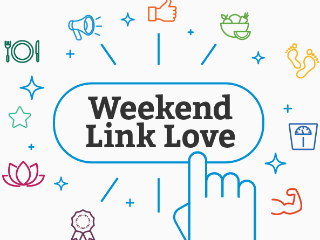 Research of the Week
Research of the WeekPostprandial insulin response just might be the best early predictor of diabetes and heart disease risk.
The average prehistoric woman had stronger arms than today’s average elite woman rower.
It doesn’t matter if you’re healthy. Drinking sugar-sweetened beverages still isn’t good for your vascular function.
Artificial light at night is a novel risk factor for cancer morbidity and metabolic disorders.
Carb restriction paired with interval training is still the best treatment for metabolic dysfunction.
New Primal Blueprint Podcasts
 Episode 197: Jacques DeVore: I chat with Jacques DeVore, top strength and conditioning coach, about his revolutionary new book and program for cyclists. Bicycling Maximum Overload for Cyclists shows cyclists how to increase speed and athletic longevity in half the training time.
Episode 197: Jacques DeVore: I chat with Jacques DeVore, top strength and conditioning coach, about his revolutionary new book and program for cyclists. Bicycling Maximum Overload for Cyclists shows cyclists how to increase speed and athletic longevity in half the training time.
Each week, select Mark’s Daily Apple blog posts are prepared as Primal Blueprint Podcasts. Need to catch up on reading, but don’t have the time? Prefer to listen to articles while on the go? Check out the new blog post podcasts below, and subscribe to the Primal Blueprint Podcast here so you never miss an episode.
Interesting Blog Posts
Merely thinking you exercise less than your peers—even if it isn’t true—is bad for your longevity.
If you take biotin, know that it can throw off the results of certain lab tests.
Media, Schmedia
Uptown and downtown New York City rats are diverging into different species.
Sprucing up, refining, and retelling your family story can improve your family’s future.
Everything Else
In case you were wondering what to do with all those empty Primal Kitchen mayo jars…
Graphene-fed spiders spin webs that rival the strength of kevlar.
Prehistoric global warming probably made this all possible by melting the glaciers and flushing nutrients into the ocean, kickstarting the development of complex organic life.
If free will exists, modern media is an assault on it.
Things I’m Up to and Interested In
Article I enjoyed: Modern sports as proxy for war between tribes.
I gotta say, I’m disappointed: The remains of 9 yetis turn out to be the remains of 8 bears and a dog.
Concept I’m pondering: What Western parents don’t teach their children.
Harvey Weinstein would agree: “It seems downright silly and certainly maladaptive for an animal to have sex with a plant.”
I’d certainly prefer it over vainly struggling on life support: LSD for the terminally ill.
Recipe Corner
Pot roast in the Instant Pot is about as instant as it gets.
Everyone loves spinach artichoke dip. Here’s how to do it Primal.
Time Capsule
One year ago (Dec 3– Dec 9)
A Primal Take on Cannabis – My take on toking.
How the Grok Narrative Motivates Me – The importance of story in shaping our experience of the world.
Comment of the Week
“I’m talking about it! Talked about it right here on the Primal Blueprint Podcast, in fact. ? http://blog.primalblueprint.com/episode-174-amy-berger/”
– Indeed, Amy. Folks who like their brains should check out her great book on the subject, The Alzheimer’s Antidote.

The post Weekend Link Love — Edition 480 appeared first on Mark's Daily Apple.



December 2, 2017
Creamy Broccoli Spinach Soup
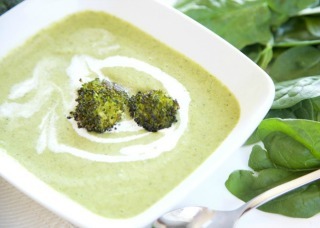 Broccoli and Spinach Soup sounds like it’s going to taste a little too healthy. Rest assured, however…. Although this soup is packed with vitamins, minerals and antioxidants from the broccoli and greens, the taste is both rich and satisfying.
Broccoli and Spinach Soup sounds like it’s going to taste a little too healthy. Rest assured, however…. Although this soup is packed with vitamins, minerals and antioxidants from the broccoli and greens, the taste is both rich and satisfying.
The depth of flavor comes from roasting broccoli, shallot, and garlic before pureeing with bone broth and a handful of fresh spinach. This alone makes a thick and creamy soup, so adding whole cream or coconut milk is optional (though, delicious).
The flavor of spinach is barely noticeable in the soup. It’s there because it’s a powerhouse green, but also because spinach gives the soup a jolt of bright green color that’s more appetizing than the usual dull green of broccoli soup.
This creamy, comforting soup is a delicious way to get a healthy helping of greens and veggies.
Servings: 4 to 6
Time in the Kitchen: 1 hour
Ingredients

2 heads broccoli (2 pounds) 900 g
1/3 cup Primal Kitchen® Avocado Oil (80 ml)
1 shallot, chopped into chunks
2 large garlic cloves, chopped into chunks
½ teaspoon salt (2.5 ml)
5 cups bone broth (or chicken stock) (1.2 L)
2 cups (or handfuls) fresh baby spinach leaves (475 ml)
Optional: ½ to 1 cup full fat canned coconut milk or whole cream (120 ml to 240 ml)
Instructions

Preheat oven to 400º F/204º C.
Cut broccoli florets from the stems.* Chop the florets up into small pieces and toss with shallot, garlic, avocado oil and salt. Spread broccoli out on two rimmed baking sheets. Roast 30 minutes, stirring once after 20 minutes, until the broccoli is tender and darkly browned around the edges.
*Recipe tip: Save the broccoli stems for snacking or salads. Peel, slice and eat raw.
In a high-powered blender, puree broccoli, shallot and garlic mixture with bone broth and spinach until very smooth.
Pour soup into a pot and bring to a simmer. Slowly stir in coconut milk or whole cream, if desired. Simmer until hot.
The soup can be refrigerated overnight and gently reheated.


The post Creamy Broccoli Spinach Soup appeared first on Mark's Daily Apple.



December 1, 2017
I Hope I Can Make This the Best Decade Yet
It’s Friday, everyone! And that means another Primal Blueprint Real Life Story from a Mark’s Daily Apple reader. If you have your own success story and would like to share it with me and the Mark’s Daily Apple community please contact me here. I’ll continue to publish these each Friday as long as they keep coming in. Thank you for reading!
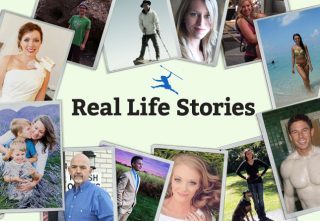 A lot of us work hard most of our life so that we can enjoy our retirement and do all the things we never had time to do when we were younger and worked long hours for little pay. The problem with that, however, is being old can pretty much suck especially with all the chronic disease that is so prevalent in Western society. Being overweight, poor digestion, fatigue and joint pain are symptoms that I am very familiar with and are just part of the aging process……or at least that’s what I used to think. They certainly create major impediments to living an active lifestyle and enjoying life.
A lot of us work hard most of our life so that we can enjoy our retirement and do all the things we never had time to do when we were younger and worked long hours for little pay. The problem with that, however, is being old can pretty much suck especially with all the chronic disease that is so prevalent in Western society. Being overweight, poor digestion, fatigue and joint pain are symptoms that I am very familiar with and are just part of the aging process……or at least that’s what I used to think. They certainly create major impediments to living an active lifestyle and enjoying life.
I always loved competitive sports growing up especially baseball and football. Although good enough to make the high school teams, I was mediocre at best, but it was still a great experience which I will always treasure. It taught me many valuable lessons which proved critical to me later in life. I also spent 2-3 years of 5 days a week of “home” weight lifting in my basement and then best friend’s root cellar. We had no idea what we were doing but worked hard an hour or two most days and were very competitive. I became quite strong for a wimp weighing 142 pounds (benched 295) but never could put on any bulk. My friend on the other hand bulked up to about 180, left me in the dust, and continues to lift to this day.
 So as an adult I took up tennis to get my competitive fix; thinking I could play the rest of my life. When I retired at 60 I was looking forward to playing tennis five days a week and working out at the gym; which I did for a couple years. Then I developed joint issues requiring surgery for De Quervain’s tenosynovitis and again for carpal tunnel syndrome. While preparing for surgery I was diagnosed with Hashimoto’s thyroiditis. After the surgeries I quit playing singles and focused on doubles as I was having too many cramping issues probably tied to the statin drugs I was taking for high cholesterol; as heart disease runs in my family. The thyroid medications probably didn’t help either.
So as an adult I took up tennis to get my competitive fix; thinking I could play the rest of my life. When I retired at 60 I was looking forward to playing tennis five days a week and working out at the gym; which I did for a couple years. Then I developed joint issues requiring surgery for De Quervain’s tenosynovitis and again for carpal tunnel syndrome. While preparing for surgery I was diagnosed with Hashimoto’s thyroiditis. After the surgeries I quit playing singles and focused on doubles as I was having too many cramping issues probably tied to the statin drugs I was taking for high cholesterol; as heart disease runs in my family. The thyroid medications probably didn’t help either.
In Nov 2013 my wife and I took a 30 day trip to Germany to visit our two daughters and grandkids for the holidays. Both of their husbands were in the Air Force, assigned to Ramstein AFB. I also had spent 5 years at Ramstein as a federal civilian; so we were also looking forward to the German brotchen and beer which we both loved. While in transit to Germany I was doing research on wild caught salmon as I decided I wanted to focus more on getting healthy and fit. The article I read came from MarksDailyApple and I became hooked. By the time I returned to the states in mid December I had spent hundreds of hours reading the blog.
I couldn’t wait to start my Primal journey on 1 Jan 2014; thinking it would be too difficult to begin right before Christmas. On 1 Jan 2014 I jumped into the Primal lifestyle and focused on high healthy fats like coconut oil, grass fed butter and avocados. Also lots of meat, fish, fresh vegetables and salads. Although the 80-20 strategy was pivotal to me believing this lifestyle was sustainable; I ended up with about 95-5 compliance. I still drink wine and/or beer almost every day in moderation of course.
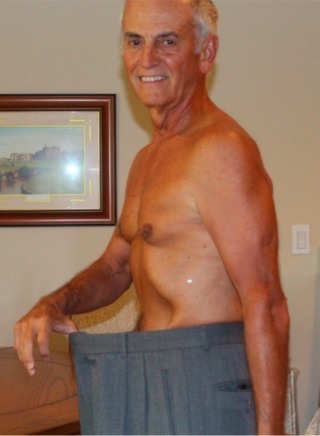 A little more background on my body type, weight and the goals I hoped to achieve. I was never considered fat by my contemporaries. Although I wanted to lose some weight (15 pounds) my primary objective was to improve my fitness and quality of life. When I retired in 2006 my weight was 178 and my waist was around 37 inches.
A little more background on my body type, weight and the goals I hoped to achieve. I was never considered fat by my contemporaries. Although I wanted to lose some weight (15 pounds) my primary objective was to improve my fitness and quality of life. When I retired in 2006 my weight was 178 and my waist was around 37 inches.
Once I started playing lots of tennis I dropped 10 pounds and could wear 36 inch waist comfortably. I felt pretty good about myself but knew I still had a spare tire around my middle and had lots of muscle cramps and joint pain. On 1 Jan 2014 I started my journey and went from 168 pounds to 150 in 45 days. I was shocked at how fast the weight came off and how much better I felt. I quit all medications as well as over the counter pills like aspirin, tylenol, aleve, etc. Since I previously lost 10 pounds after retiring I thought I was done (28 pound loss) and wanted to see if I could maintain this weight over time.
I became even more focused (my wife would say fanatic) and started reading and listening to podcasts 3-4 hours every day on paleo/primal and functional medicine. I started playing singles again as well as going to the fitness center for 30 minutes 3 times a week for resistance training. I experimented on myself often, figuring I have little to lose and much to gain considering my age. A few of the more important hacks I utilize are Bulletproof coffee (3 cups per day/3-4 Tbsp of coconut oil and grassfed butter), taking potato starch, ACV daily, diatomaceous earth, bentonite clay, etc.
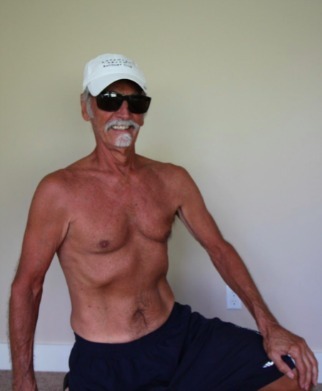
Intermittent fasting and keto have been the two most critical components of continued weight loss. I often only eat one meal per day in the late afternoon primarily because I am not very hungry even though I am pretty active. I do believe that most of us eat too much and that feeling a little hungry is important to a longer and healthier life. I have snacks like nuts and seeds, or a cup of bone broth, boiled eggs, sardines, etc. I average less than 45 carbs per day. My wife thinks I am too thin and I agree I looked better when I was heavier but I feel much better than I have in a very long time. I still have thyroid issues and some joint pain but hope to mitigate that over time. My current weight is 138 plus or minus 2 pounds contingent on my activities.
I will always be indebted to Mark Sisson and his Primal Blog which I continue to refer people to and read on a regular basis. The Primal Blueprint by Mark is a must read for anyone considering the ancestral health lifestyle.

From my perspective the most important impact this lifestyle has had on me is psychological, my outlook on life…….getting old but still looking forward. Growing old can be depressing at times especially if you have numerous health issues and take lots of medications. Living longer might be nice but is not the objective…….being healthy, having fun and enjoying family and friends for the time you do have is. For some strange reason my high school yearbook caption from 1964 was: “The Days of our Youth are the Days of our Glory.” I hope that I can turn that on it’s head and make this decade the best yet. Grok on!
Vital Statistics:
5’8” tall
138 pounds
31 inch waist
Total Cholesterol from 271 (Jan 2014) to 233 (Feb 2017) and don’t want it to get any lower
Triglycerides from 219 to 45
HDL from 34 to 66
BMI approx 20.6
Body Fat – by scale Est 12%
Age 71
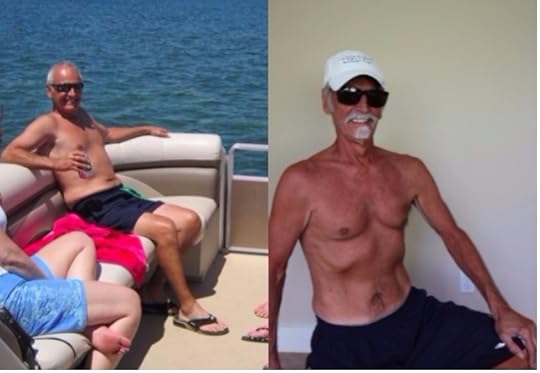
Want to make fat loss easier?
Try the Definitive Guide for Troubleshooting Weight Loss for free here.
The post I Hope I Can Make This the Best Decade Yet appeared first on Mark's Daily Apple.



November 30, 2017
21 Books to Begin 2018
 The book is an ancient technology whose importance has only increased in modern times. With a book, you gain access to another person’s mind or life experiences. That’s hard to beat. People who aren’t reading are really selling themselves short and missing out on an enjoyable pastime as well as a leg up on the competition.
The book is an ancient technology whose importance has only increased in modern times. With a book, you gain access to another person’s mind or life experiences. That’s hard to beat. People who aren’t reading are really selling themselves short and missing out on an enjoyable pastime as well as a leg up on the competition.
Here are some fantastic books to dig into this coming year. Most of them are new and deal with health, fitness, and nutrition. Others are about history, productivity, or self-improvement. Some are just fun reads. They’re some of my recent (or long-time) favorites and all great options for people looking to read more this coming year.
Health and Nutrition
Keto Reset by yours truly and Brad Kearns
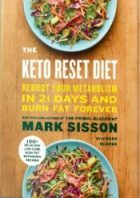 What can I say? I’m shamelessly sticking this at the top because giving people the tools to unlock their inherent fat-burning abilities is extremely important. And not just for the way we look in a mirror and fit our clothes, but also for how our brain functions, how we age, and how we burn fuel during physical activity. Not everyone has to (or even should) go keto forever, but everyone should spend some time in a ketogenic state. This book reveals the best way to do so safely and sustainably.
What can I say? I’m shamelessly sticking this at the top because giving people the tools to unlock their inherent fat-burning abilities is extremely important. And not just for the way we look in a mirror and fit our clothes, but also for how our brain functions, how we age, and how we burn fuel during physical activity. Not everyone has to (or even should) go keto forever, but everyone should spend some time in a ketogenic state. This book reveals the best way to do so safely and sustainably.
For: Anyone who wants to burn fat more effectively.
Wired to Eat by Robb Wolf
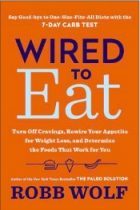 Robb is one of the greatest at breaking down complex scientific topics into easily-digestible nuggets of actionable information that anyone can absorb and utilize. This latest book is a few hundreds pages of exactly that. If you want to understand why eating and moving right is so hard for so many on a biochemical and behavioral level—and then learn how to overcome it to achieve optimal health and wellness—read this book.
Robb is one of the greatest at breaking down complex scientific topics into easily-digestible nuggets of actionable information that anyone can absorb and utilize. This latest book is a few hundreds pages of exactly that. If you want to understand why eating and moving right is so hard for so many on a biochemical and behavioral level—and then learn how to overcome it to achieve optimal health and wellness—read this book.
For: Anyone struggling with eating or exercising the way they know they should.
Genius Foods by Max Lugavere
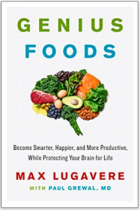 More than how much we can lift, how fast we can run, or even how good we look naked, our primary concern—above all else—is making our brains work well into old age. Nobody wants to lose control of their mental faculties, because once that goes, everything else follows and nothing else matters. Lugavere’s upcoming book (due March 2018) explains how to prevent dementia, improve cognitive function, and preserve psychological health using nutritional and lifestyle interventions. Very important topic.
More than how much we can lift, how fast we can run, or even how good we look naked, our primary concern—above all else—is making our brains work well into old age. Nobody wants to lose control of their mental faculties, because once that goes, everything else follows and nothing else matters. Lugavere’s upcoming book (due March 2018) explains how to prevent dementia, improve cognitive function, and preserve psychological health using nutritional and lifestyle interventions. Very important topic.
For: Big-brained hominids.
Unconventional Medicine by Chris Kresser
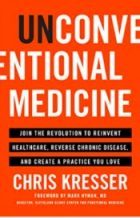 I always like to hear and read what Chris has to say on health and nutrition. He’s very careful with his recommendations and rarely makes mistakes. With that in mind, his latest book is a powerful and convincing plea for medical practitioners to help him fix a broken medical system that applies ineffective bandaids to complex chronic health issues rather than try to solve them. If you think we need to redesign healthcare (we do) and aren’t impressed with any of the current offerings on the table (me neither), this book will show us a way forward.
I always like to hear and read what Chris has to say on health and nutrition. He’s very careful with his recommendations and rarely makes mistakes. With that in mind, his latest book is a powerful and convincing plea for medical practitioners to help him fix a broken medical system that applies ineffective bandaids to complex chronic health issues rather than try to solve them. If you think we need to redesign healthcare (we do) and aren’t impressed with any of the current offerings on the table (me neither), this book will show us a way forward.
For: Fed-up, burned-out doctors.
Body Love by Kelly LeVeque
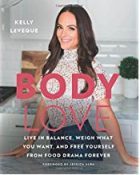 Do you love your body? Few do. Kelly LeVeque shows you how to stop the food obsession and start loving your body, but not because you’re deluded about your own health and fitness. You’ll learn to love it because you’ve made it fit and healthy.
Do you love your body? Few do. Kelly LeVeque shows you how to stop the food obsession and start loving your body, but not because you’re deluded about your own health and fitness. You’ll learn to love it because you’ve made it fit and healthy.
For: People looking for a different perspective.
Paleo Principles by Sarah Ballantyne
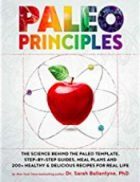 A one-stop shop for going paleo that includes everything you’ll need, including the science behind the diet, step-by-step guides for incorporating the new way of eating and living, meal plans, recipes, and well, what else could you ever need?
A one-stop shop for going paleo that includes everything you’ll need, including the science behind the diet, step-by-step guides for incorporating the new way of eating and living, meal plans, recipes, and well, what else could you ever need?
For: Beginners or old-timers who need a refresher.
The Salt Fix by James NiColantonio
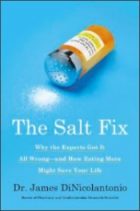 For decades the experts have inundated us with recommendations to reduce salt in our diets. They said it was responsible for hypertension and heart disease, bloating and kidney disease. The Salt Fix destroys these myths, explaining not only why salt isn’t the villain it’s made out to be but also why salt is an essential part of the human diet. A great read.
For decades the experts have inundated us with recommendations to reduce salt in our diets. They said it was responsible for hypertension and heart disease, bloating and kidney disease. The Salt Fix destroys these myths, explaining not only why salt isn’t the villain it’s made out to be but also why salt is an essential part of the human diet. A great read.
For: Anyone still a little nervous about sodium.
Fitness and Movement
The Brave Athlete by Simon Marshall and Paterson Lesley
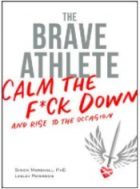 Between cutting edge nutrition and training techniques, gadgets that track recovery, mobility programs designed to minimize injuries and advanced surgical techniques designed to fix them, modern athletes have the physical side of competition pretty well taken care of. Unfortunately, those can’t really help the mental side of it all. In The Brave Athlete, sport psychologist Marshall and elite triathlete Lesley provide the tools for getting to and defeating the root cause of the mental dilemmas modern athletes face.
Between cutting edge nutrition and training techniques, gadgets that track recovery, mobility programs designed to minimize injuries and advanced surgical techniques designed to fix them, modern athletes have the physical side of competition pretty well taken care of. Unfortunately, those can’t really help the mental side of it all. In The Brave Athlete, sport psychologist Marshall and elite triathlete Lesley provide the tools for getting to and defeating the root cause of the mental dilemmas modern athletes face.
For: Athletes.
Deskbound by Kelly Starrett
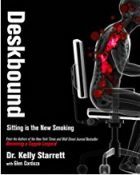 We all know how excessive sitting is destroying our bodies and setting us up for shorter, worse lives. In this book, Kelly Starrett doesn’t just diagnose the problem. He gives you specific movements, skills, and other solutions to not only sit less, but make the sitting you do less damaging.
We all know how excessive sitting is destroying our bodies and setting us up for shorter, worse lives. In this book, Kelly Starrett doesn’t just diagnose the problem. He gives you specific movements, skills, and other solutions to not only sit less, but make the sitting you do less damaging.
For: Desk jockeys.
Cookbooks
Kitchen Intuition by Devyn Sisson
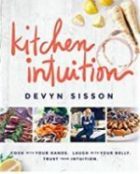 I may be biased. This is my daughter’s book, and I’m the publisher. I don’t care—I was there during the hundreds of hours of recipe trials. I tasted it all. I smelled it all. The food is good. Best of all, Devyn’s book fills a void for many of her generation who don’t know their way around the kitchen. cooking is an important skill that too many people are letting drift into obscurity; buy this book and fight back!
I may be biased. This is my daughter’s book, and I’m the publisher. I don’t care—I was there during the hundreds of hours of recipe trials. I tasted it all. I smelled it all. The food is good. Best of all, Devyn’s book fills a void for many of her generation who don’t know their way around the kitchen. cooking is an important skill that too many people are letting drift into obscurity; buy this book and fight back!
For: Anyone who wants to discover (or rekindle) a love for cooking.
The Primal Kitchen Cookbook by yours truly
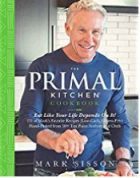 I got together with some of the top names in paleo and Primal to cook some awesome food then tell you guys how to cook it, too. Many of the recipes use Primal Kitchen products, so be warned (thoughh you can always make substitutions; they just might not taste the same!).
I got together with some of the top names in paleo and Primal to cook some awesome food then tell you guys how to cook it, too. Many of the recipes use Primal Kitchen products, so be warned (thoughh you can always make substitutions; they just might not taste the same!).
For: Anyone who likes MDA.
Ready or Not! by Michelle Tam and Henry Fong
 NomNomPaleo continues to be the best paleo recipe blog around, and now they’re out with a brand new book. It’s got their signature aesthetic style that everyone knows and loves. It’s got the requisite beautiful photography. But most important, the food is really, really good. Buy this one.
NomNomPaleo continues to be the best paleo recipe blog around, and now they’re out with a brand new book. It’s got their signature aesthetic style that everyone knows and loves. It’s got the requisite beautiful photography. But most important, the food is really, really good. Buy this one.
For: Fans of umami.
Healing Mushrooms by Tero Isokauppila
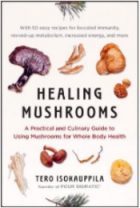 Mushrooms are a mystery. They’re often relegated to the vegetable category, but they’re much more than that. There are hundreds of edible mushrooms available, and they’re all different from each other. What’s coolest is that mushrooms don’t just taste great. They’re usually downright medicinal. If you’re curious about eating these incredibly healthy life forms but don’t know where to start, this book is just the ticket.
Mushrooms are a mystery. They’re often relegated to the vegetable category, but they’re much more than that. There are hundreds of edible mushrooms available, and they’re all different from each other. What’s coolest is that mushrooms don’t just taste great. They’re usually downright medicinal. If you’re curious about eating these incredibly healthy life forms but don’t know where to start, this book is just the ticket.
For: People who listened to Paul Stamets on Joe Rogan the other day.
Salt, Fat, Acid, Heat by Samin Nosrat
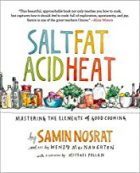 More than just write a recipe book, Nosrat lays out the basic blueprint for creating food that tastes good to the largest audience. Recipes are great and all, but by reading this book you’ll learn how to use basic elements of good cooking—salt, for enhancing flavor; fat, for delivering flavor and providing textural richness; acid, for balancing flavors; and heat, for controlling the texture of the food. Everything after that is just window dressing.
More than just write a recipe book, Nosrat lays out the basic blueprint for creating food that tastes good to the largest audience. Recipes are great and all, but by reading this book you’ll learn how to use basic elements of good cooking—salt, for enhancing flavor; fat, for delivering flavor and providing textural richness; acid, for balancing flavors; and heat, for controlling the texture of the food. Everything after that is just window dressing.
For: Beginners and advanced cooks.
Against All Grain Celebrations by Danielle Walker
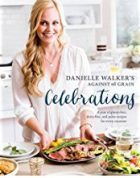 Despite (or perhaps because of) having an autoimmune disease, Danielle Walker cooks incredible food. She can’t eat grains or dairy, which many foodies consider a death knell for any real chef. Not so: Against All Grain Celebrations shows how cooking with only ancestral, paleo ingredients is more than you need to make food that outshines everything else at the party.
Despite (or perhaps because of) having an autoimmune disease, Danielle Walker cooks incredible food. She can’t eat grains or dairy, which many foodies consider a death knell for any real chef. Not so: Against All Grain Celebrations shows how cooking with only ancestral, paleo ingredients is more than you need to make food that outshines everything else at the party.
For: People food food intolerances, autoimmune diseases, or a desire to eat delicious food.
Pleasure
Mosquito Coast by Paul Theroux
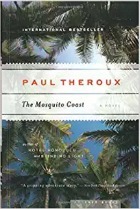 This is one of my favorite books of all time. It’s the story of a brilliant but unrecognized inventor who uproots his family to move to the Honduran jungle, where he tries to start a small slice of civilization free of rampant consumerism and crushing materialism. I use his descent into madness as a barometer for my outrage at society.
This is one of my favorite books of all time. It’s the story of a brilliant but unrecognized inventor who uproots his family to move to the Honduran jungle, where he tries to start a small slice of civilization free of rampant consumerism and crushing materialism. I use his descent into madness as a barometer for my outrage at society.
The movie’s pretty good, too, with the late and great River Phoenix along with one of Harrison Ford’s best and most under-appreciated performances.
For: Outsiders.
Orphan X by Gregg Hurwitz
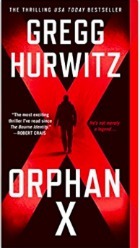 This is just a well-done thriller about a former secret agent who left the fold after doing one too many unsavory jobs and now works pro-bono for good causes. Great for a rainy weekend or day at the beach (weather depending).
This is just a well-done thriller about a former secret agent who left the fold after doing one too many unsavory jobs and now works pro-bono for good causes. Great for a rainy weekend or day at the beach (weather depending).
For: Fans of the Jason Bourne books/movies.
Philip K. Dick short story collection by Philip K. Dick
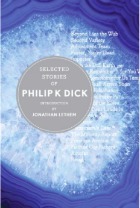 I’ve read a lot of Dick short stories, and I can never keep track of which collections are which. All I know is that he’s a master at building horrifying yet believable worlds in the span of a few pages. He’s got some great novels, like Do Androids Dream of Electric Sheep and The Man in the High Castle, but some of them run a bit long and sprawl a bit too much. His short stories are more focused, easy to digest, and sit with you a long time. This particular collection includes Minority Report (inspired the movie) and We Can Remember It For You Wholesale (inspired Total Recall).
I’ve read a lot of Dick short stories, and I can never keep track of which collections are which. All I know is that he’s a master at building horrifying yet believable worlds in the span of a few pages. He’s got some great novels, like Do Androids Dream of Electric Sheep and The Man in the High Castle, but some of them run a bit long and sprawl a bit too much. His short stories are more focused, easy to digest, and sit with you a long time. This particular collection includes Minority Report (inspired the movie) and We Can Remember It For You Wholesale (inspired Total Recall).
For: People wondering about what the future holds, fans of Black Mirror.
The Force by Don Winslow
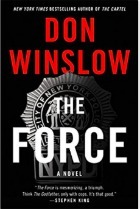 The best novel I’ve read in many years. This is cop fiction at its very best, but it’s also not a book to be pigeonholed. Complex in its portrait of a city and a central character, there’s real meat to be appreciated here. Be warned, though: it’s dark, gritty, and unrelenting.
The best novel I’ve read in many years. This is cop fiction at its very best, but it’s also not a book to be pigeonholed. Complex in its portrait of a city and a central character, there’s real meat to be appreciated here. Be warned, though: it’s dark, gritty, and unrelenting.
For: Anyone into crime novels.
Self-Improvement
Tribe of Mentors by Tim Ferriss
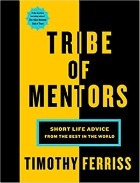 Tim Ferriss is the king of productivity, and in this latest book, he draws on his considerable well of mentors for their advice about how to live and work well. He sent 11 questions (read them here) to all the experts, iconoclasts, and top performers he knows, then compiled their answers in this new book. It’s a great one to thumb through and digest in bits and bites.
Tim Ferriss is the king of productivity, and in this latest book, he draws on his considerable well of mentors for their advice about how to live and work well. He sent 11 questions (read them here) to all the experts, iconoclasts, and top performers he knows, then compiled their answers in this new book. It’s a great one to thumb through and digest in bits and bites.
For: Anyone who wants to know how the greats think.
Deep Work by Cal Newport
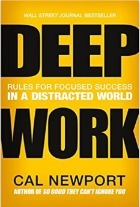 We have more productivity tools than ever before. We can access millions of books, articles, studies, and lectures in seconds, much of it free. This ease of access to information is a blessing and a curse, because there are distracting forces vying for our attention. It’s far easier to get sucked into your email, social media spat, or a clickbait article than it is to stay focused for hours at a time on a task or learning something that will further your goals. But those who can stay focused and do what Cal Newport calls “deep work” will have a huge advantage in the coming years.
We have more productivity tools than ever before. We can access millions of books, articles, studies, and lectures in seconds, much of it free. This ease of access to information is a blessing and a curse, because there are distracting forces vying for our attention. It’s far easier to get sucked into your email, social media spat, or a clickbait article than it is to stay focused for hours at a time on a task or learning something that will further your goals. But those who can stay focused and do what Cal Newport calls “deep work” will have a huge advantage in the coming years.
For: Anyone interested in overcoming distraction and increasing focus.
History and Culture
Sapiens by Yuval Noah Harari
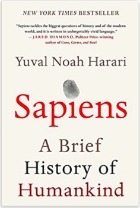 Sapiens follows humans from our early proto-hominid days up through the present day. From encounters to Neanderthals to the cognitive revolution to the advent of agriculture to the creation of money as a concept to the establishment of the major religions to the scientific revoltuion to the industrial revolution to the information age to what Harari suspects will be the end of Homo sapiens as we know them (us), the book is an entertaining overview of human history and a clever guess at what may lie in store.
Sapiens follows humans from our early proto-hominid days up through the present day. From encounters to Neanderthals to the cognitive revolution to the advent of agriculture to the creation of money as a concept to the establishment of the major religions to the scientific revoltuion to the industrial revolution to the information age to what Harari suspects will be the end of Homo sapiens as we know them (us), the book is an entertaining overview of human history and a clever guess at what may lie in store.
For: Anyone interested in grand narratives.
The Abolition of Man by C.S. Lewis
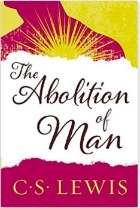 By no means a recent release, this is C.S. Lewis’ argument against moral relativity and for the existence of an objective, foundational moral code, which he calls the Tao. I’m not sure where I come down on the question, but it’s certainly something I’ve been thinking about harder than ever. It’s a quick but heavy read.
By no means a recent release, this is C.S. Lewis’ argument against moral relativity and for the existence of an objective, foundational moral code, which he calls the Tao. I’m not sure where I come down on the question, but it’s certainly something I’ve been thinking about harder than ever. It’s a quick but heavy read.
For: Anyone looking to get their bearings.
That’s it for me, folks. What about you? What are you reading? What are you planning to read? (I’m always on the lookout for new favorites.) Thanks for stopping by today. Take care, everybody.
The post 21 Books to Begin 2018 appeared first on Mark's Daily Apple.



November 29, 2017
Why Aren’t We Talking About the Cognitive Health Crisis?
 If you look at the latest stats, you might assume there’s no cognitive health crisis. The overall number of dementia cases are going up, but that’s because the aging population is growing. Older folks are living longer than ever before, so there are more people around who can develop dementia. Dementia and Alzheimer’s rates are dropping in the Western world. Politicians, those archetypical paragons of cognitive aptitude, are hanging around in office longer than ever. Technology, science, and other fields that require large amounts of cognitive ability are progressing.
If you look at the latest stats, you might assume there’s no cognitive health crisis. The overall number of dementia cases are going up, but that’s because the aging population is growing. Older folks are living longer than ever before, so there are more people around who can develop dementia. Dementia and Alzheimer’s rates are dropping in the Western world. Politicians, those archetypical paragons of cognitive aptitude, are hanging around in office longer than ever. Technology, science, and other fields that require large amounts of cognitive ability are progressing.
But broad trends and large numbers are just statistics. However reassuring they are to public policy analysts, they mean nothing to the individual suffering from cognitive decline. They’re too abstract. Your grandpa no longer knowing who you are? That’s real. You, personally, don’t want to lose your cognitive abilities as you age. You, personally, don’t want to see the people you love get Alzheimer’s. Individual cases matter to those individuals and their loved ones. And it’s still happening more than it should.
Maybe more than any other disease, severe cognitive impairments have the potential to unravel families. They’re not one and done. They drag on. They aren’t “lethal” in the normal sense. People with Alzheimer’s can lead long lives, the latter halves of which can get very difficult for everyone involved. There’s an entire body of literature devoted to studying the effects of Alzheimer’s on families and caregivers and discovering effective methods for mitigating the damage done. You don’t get that so much with other diseases.
Yet for whatever reason, Alzheimer’s doesn’t get enough attention. Sure, it’s mentioned. People are aware it exists. They can probably name the general symptoms. But it doesn’t seem as pressing a concern as something like cancer, diabetes, or heart disease.
One reason is that cognitive diseases are really scary to consider. Most other diseases affect what we consider to be the peripheral tissues. Heart disease is about the heart. Kidney disease affects the kidneys. Cancer can strike anywhere, but it’s usually in an organ or bone. Most diseases leave our personhood intact. We’re still us, even when we’re riddled with tumors or on dialysis. But with something like Alzheimer’s, we disappear. We forget who we are. We forget where we live, how old we are, and the name of that stranger hovering over us with a concerned look on her face. People define themselves by their intellect; our superior mind is what sets us apart from the rest of the animal kingdom. When that goes, what’s left? No one wants to think about that.
Another reason is that the conventional take on Alzheimer’s and other cognitive disorders is that we are helpless in the face of it. Most of the drugs have failed. Even the chief executive of Alzheimer’s Research UK accepts as “fact that there are no treatments to slow or stop the diseases behind dementia.” When the authorities are throwing up their hands and giving in, what is a lay person supposed to do but despair and stop thinking about it?
That has to change. There are legitimate treatments available. The problem is that the treatments aren’t “take this pill and call me in the morning.” They require lifelong commitments to healthy living, eating, and exercising.
In the most promising study I’ve seen, researchers had Alzheimer’s patients undertake a dramatic diet, exercise, and lifestyle shift. Bear in mind that this was a case study, or rather ten of them involving ten subjects, not a clinical trial involving hundreds. Still, the results were striking. Here’s what each subject did:
Eliminate all simple carbs and follow a low-glycemic, low-grain (especially refined grains) diet meant to reduce hyperinsulinemia.
Observe a 12-hour eating window and 12-hour fast each day, including at least three hours before bed.
Stress reduction (yoga, meditation, whatever works for the individual).
Get 8 hours of sleep a night (with melatonin if required).
Do 30-60 minutes of exercise 4-6 days per week.
Get regular brain stimulation (exercises, games, crosswords).
Supplement to optimize homocysteine, vitamin B12, CRP levels.
Take vitamin D and vitamin K2.
Improve gut health (prebiotics and probiotics).
Eat antioxidant-rich foods and spices (blueberries, turmeric).
Optimize hormone balance (thyroid panel, cortisol, pregnenolone, progesterone, estrogen, testosterone).
Obtain adequate DHA to support synaptic health (fish oil, fish).
Optimize mitochondrial function (CoQ10, zinc, selenium, other nutrients).
Use medium chain triglycerides (coconut oil, MCT oil).
Looks awfully familiar, doesn’t it? They weren’t messing around. They were even careful enough to include vitamin K2 with vitamin D. They had them fast. They were aware of the benefits of fats and ketones for the brain and didn’t even use a full-blown ketogenic diet to provide them.
How’d the subjects do?
First of all, they started with memory impairment from Alzheimer’s, amnesiac cognitive impairment, and/or subjective cognitive decline. They started from pretty serious deficits.
Nine of the ten patients showed subjective or objective improvements in cognitive function and performance within 3-6 months. The one failure was a person with late-stage Alzheimer’s disease.
Of the six patients who’d had to stop working due to their cognitive decline, all six were able to return to work.
In a 2.5 year followup, the patients had sustained and even improved on their results.
Note that they didn’t worry about “saturated fat” or “butter.” Only one subject stopped eating “meat.” Another switched to grass-fed beef over conventional beef. There were no mentions of sodium restriction or statin drugs.
This was published in 2014. The same researcher even confirmed that the protocol worked in ApoE4 subjects, the genetic variant that increases the risk of Alzheimer’s. Even the cynics over at Science Based Medicine were cautiously optimistic about it. Why aren’t Alzheimer’s researchers shouting from the rooftops and demanding more funding to run larger studies using this protocol?
I hate to assume the worst—that it doesn’t involve a patentable pharmaceutical—but what else can I do?
In the meantime, we have work to do. It’s going to take a lot to beat this. For one, we won’t beat it by reacting to the disease (although, as the case studies show, that can help and even reverse the disease before it’s progressed too far). We have to be proactive. We have to get sleep, sun, food, exercise, community, and every other lifestyle factor under control from day one. We have to stay abreast of the latest research into how diet and lifestyle affect brain function. What your kids do today may very well affect their cognitive health down the road. If that sounds heavy, it’s supposed to be. This is serious stuff, folks. You can’t play around with the most complex structure in the known universe: the human brain. Take no chances. Spare no expense.
And even then, it might not work. These were just case studies without placebo controls, after all. But at the very least, getting enough sleep and sunlight, learning to burn fat more effectively, eating micronutrient-rich diets, consuming polyphenol-rich spices and herbs, occasionally producing and burning ketones, optimizing our hormone panels, reducing or mitigating stress, avoiding hyperinsulinemia and insulin resistance, improving our gut health, and exercising on a regular basis is a good start that won’t hurt us.
That’s my plea for the day. Thanks for reading, folks.
Thoughts to share on how we talk about or treat cognitive health conditions? I’d like to read your feedback.
Want to make fat loss easier?
Try the Definitive Guide for Troubleshooting Weight Loss for free here.
The post Why Aren’t We Talking About the Cognitive Health Crisis? appeared first on Mark's Daily Apple.



November 28, 2017
The Health Toll of Financial Stress
 Sure, this post comes right on the heels of Cyber Monday…but is there ever a perfect time for a message like this? Yes, I run a business, but I still don’t mind kicking the cultural hornet’s nest. Some things don’t change.
Sure, this post comes right on the heels of Cyber Monday…but is there ever a perfect time for a message like this? Yes, I run a business, but I still don’t mind kicking the cultural hornet’s nest. Some things don’t change.
But that doesn’t mean there isn’t contradiction. Here I am doing my own holiday shopping today (don’t tell Carrie)—and offering my own deals to those who are interested. The holidays—with all the shopping and parties and prep—are fun. No doubt. Simultaneously, I know financial stress takes a major toll this time of year, and it doesn’t have to be that way.
Estimates for last year’s Christmas gift spending placed the average American in the vicinity of $936—with the average parent spending an additional $422 per child on top of that already princely sum. (Whether that figure still holds true in a family of four or five is debatable.)
And that may not even be the half of it. Holiday dinners, events, decorations, clothing, and trips add to the price tag. The result? More than half of us rack up debt for holiday expenditures, a sizable portion of which will take more than half a year to pay off.
Financial stress carries over past the festivities of the season, and its costs can be much higher than a credit card total.
Financial Stress at The Holidays
Let’s talk numbers. According to the National Retail Federation, U.S. retail sales during the 2015 holiday season surpassed the GDP of 181 other countries. That’s more spending on presents, food and holiday sundries than the combined GDP of countries like South Africa, Sweden and Norway…amounting to a whopping $630+ billion.
Perceived social expectations set the stage. A few years back, a survey of 1000 Americans across all income brackets found that 45% of those polled were under so much financial pressure that they’d prefer to skip the holiday scrabble altogether. Another 45% said they didn’t have enough money set aside to cover holiday expenses.
It gets worse. While 41% of people are unable to survive more than two weeks without a paycheck, 59% of people are carrying debt into the new year. Not surprisingly, a 2015 Healthline survey showed that over 60% of people get stressed out just thinking about the holiday season, with finances being the biggest cause of that stress.
The Health Costs
Even within the Primal community, there’s a tendency to focus on tangible sources of stress—inflammatory foods, toxic compounds in our living environment, etc. Yet, financial woes crop up again and again as one of the most pervasive forms of stress.
A 2008 study found that college students with a debt of $1000 or more were at significantly higher risk of obesity, excess TV viewing, infrequent breakfast consumption, fast food consumption, binge drinking, substance abuse, and lack of exercise.
In another study, financial strain held a particularly strong association with heavy drinking and smoking among elderly men. Further research indicates that smokers with financial stress are less likely to try to quit, less likely to succeed if they do try, and more likely to relapse. Presumably, it’s something of a vicious cycle, with smoking leading to financial strain, which in turn promotes more smoking. Stress can send us into a cul-de-sac of bad habits.
Over time, these stress-justified bad habits are likely to create their own slew of health problems, the most common of which is weight gain. In a study involving 1,355 U.S. men and women, increasing levels of psychosocial stress in the form of “difficulty paying bills” was associated with a higher propensity for weight gain. The mechanisms behind this are well understood, with higher levels of stress leading to the development of “palatable food” (aka junk food) motivation and engagement in overeating to offset the negative emotional effects of stress. This higher energy intake, coupled with a reduction in physical activity, stimulates visceral fat accumulation. The rest is history.
Perhaps most famously, higher levels of stress, both acute and chronic, have been associated with impaired cardiovascular health and life-threatening complications. Research shows that work-related stress, which often goes hand in hand with financial stress, can increase a person’s risk of a first coronary heart disease (CHD) event. Among existing CHD patients, long-term stress can increase the risk of repeat CHD events and mortality. Other studies indicate that psychological stressors can lead to sudden death, myocardial infarction, myocardial ischemia, and wall motion abnormalities.
But that’s just the tip of the iceberg. In the brain, stress undermines well-being by releasing corticosteroid hormones that control neuronal and network responses tied to behavioral adaptation. In acutely stressful scenarios, this process is beneficial to our survival, heightening awareness and honing reflexes. But over the long term, such as is the case in chronic financial strain, these corticosteroid binary control mechanisms can erode mental health and promote brain disease.
In the early days, this detrimental effect of stress on the brain can manifest in impaired cognitive function. For example, male rats exposed to 21 days of restraint stress exhibited both reduced visual and spatial memory, while chronic unpredictable stress can drastically alter the behavior of rats and promote a rapid shift towards habitual tendencies. The mechanisms by which humans respond to stress aren’t all that different.
Then there’s sleep. Even among the elderly, financial stress appears to be a key contributor to poor sleep, with ongoing financial strain correlated with difficulty falling asleep, difficulty staying asleep, and impaired sleep efficiency. Another study involving a wider age range of subjects found that financial strain was associated with decreased sleep quality and lower sleep efficiency.
And if you’re not sleeping well, you’re probably not aging well. Researchers postulate that chronic psychological stress “is significantly associated with higher oxidative stress, lower telomerase activity, and shorter telomere length, which are known determinants of cell senescence and longevity.” In other words, financial stress leads to oxidative stress, which undermines the health and longevity of your cells—making you age faster.
Then there’s all the digestive issues that come with chronic stress. In animal models, stress has been shown to promote the “development of gastric ulcers, altered gastrointestinal motility and ion secretion, and increased intestinal permeability.” Stress also teams up with other pathogenic factors in the GI tract, including H. pylori and NSAIDs, to encourage gastrointestinal disease.
Indeed, the type of stress induced by financial strain has been associated with almost all of the most common chronic digestive diseases, including functional gastrointestinal disorders, inflammatory bowel disease, and gastro-oesophageal reflux disease. So many of us have been there at some point….
Final Thoughts: Sidestepping the Financial Circus
Short of packing the car and whisking the kids away from all civilization, there are plenty of steps we can take to keep budgetary sanity. I’ll share a couple thoughts, and I invite you to offer your own strategies for keeping a handle on the finances as you enjoy the best of the season.
Ditch Debt
With the deceptive ease of credit cards, it’s all too easy to blindly spend and worry about the consequences later. No rocket science here of course, but we can all benefit from figuring what we can afford to buy without borrowing this month, and to stick to that amount. Clarity around financial matters isn’t a killjoy. It just offers the objective facts we have to work with.
Smart shopping, deep discount or consignment bargains, secret Santa exchange, or a one-gift-per-family-member policy can ensure present spending doesn’t break the bank. For the holiday meal, consider taking a drive to the farmgate to purchase your turkey and ham and save a considerable sum.
More importantly, make a point of not using your credit card for your holiday spending— meaning when the cash runs out, the buying stops and there’s no debt accruing. (Anybody still use the old envelope system? Some things shouldn’t ever go out of style.)
If need be—and there’s nothing wrong with hardcore accountability, give your credit cards to a (trusted) friend and tell them not to give it back until after the festivities are truly done and over.
Forget the Crowds
We’ve all been there: a shopping mall packed to the rafters in the weeks leading up to the holidays, filled with people like you desperate to get their last minute gift buying and food acquiring out of the way. It’s not an enjoyable time in anyone’s life, even if there are no budgetary constraints. I know I personally don’t make good decisions in that environment.
My solution is to ditch the crowds altogether and do most of my holiday buying online. It means something to shop from the sanity of your own home and walk away from the computer when you’ve had enough—financially or otherwise. It’s open anytime, so I can research, mull, and make decisions when I’m ready to make them. And let’s be honest…the experience is more pleasant with a glass of wine anyway.
Thanks for reading folks. What’s your strategy for staving off financial stress over the holiday season? Take care.
The post The Health Toll of Financial Stress appeared first on Mark's Daily Apple.



November 27, 2017
Dear Mark: New Coffee Study, Letting a Fever Run its Course, Collagen Dosage
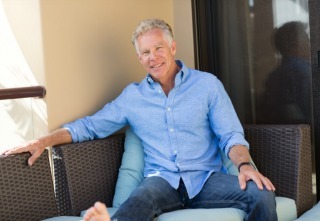 For today’s edition of Dear Mark, I’m answering three questions from readers. First, I give my take on a new, big coffee study, which analyzed several meta-analyses of existing coffee and health data. Second, should you let a fever run its course or try to defeat it at all costs? The body obviously “wants” to get hotter in these situations. Is there a good reason? And finally, how much glycine do people need per day?
For today’s edition of Dear Mark, I’m answering three questions from readers. First, I give my take on a new, big coffee study, which analyzed several meta-analyses of existing coffee and health data. Second, should you let a fever run its course or try to defeat it at all costs? The body obviously “wants” to get hotter in these situations. Is there a good reason? And finally, how much glycine do people need per day?
Let’s go:
Rudy asked:
Hey Mark,
Did you get a chance to see the latest study on coffee? There are a lot of connections, both good and bad. What were your biggest takeaways?
Here’s the full study.
On the whole, coffee seems to help, not hurt. While there are some associations between coffee consumption and poor health outcomes, they’re outweighed by the beneficial associations.
What’s a bigger scourge our society—type 2 diabetes or childhood cleft malformations? No disease or disorder should be taken lightly, however rare it may be, but if we’re just crunching numbers, the diseases coffee consumption seems to reduce are a bigger threat than the diseases it seems to promote.
The studies that found health benefits for coffee were more numerous and had more participants than those finding negative effects. For instance, there were 27 studies including over a million participants showing benefits against type 2 diabetes but only 6 studies with just under 5000 participants showing links between coffee and acute child leukemia.
What I found most interesting (and telling) was the apparent coffee/LDL/heart disease paradox. One of the strongest protective associations coffee had was with cardiovascular disease. People with high intakes had a much lower rate of death from cardiovascular disease than people with low intakes. It hasn’t been causally linked, of course, as the authors drew primarily on observational studies, but we can at least surmise that it’s not bad for your heart. Yet, despite those protective associations, coffee consumption was also linked to higher LDL levels—and in a dose response manner, meaning the more coffee one drank, the higher their LDL levels.
How could this be? Isn’t LDL supposed to ravage our bodies, clog our arteries, and doom us to cardiovascular disease?
Maybe LDL increases that result from diet are qualitatively different than LDL increases with non-dietary causes (like genetics). I don’t know, but it sure is interesting.
In the end, most of the associations with negative health effects were weak, inconsistent, and they often disappeared when you controlled for other health variables like smoking. There were some standout categories where coffee really did seem to be problematic, like in pregnancy or fracture risk. Even those are easy to solve—don’t drink caffeinated coffee during pregnancy, and be sure to keep an eye on your bone health if you’re a woman who drinks a lot of coffee.
Sara asked:
Hi Mark,
It’s cold and flu season and with three kids, it seems like someone’s always got something. Should I treat the fever or let it do its thing? Sara
I’m a firm believer in letting the fever run its course. That fever is happening for a reason.
And that’s without “hard evidence.” It’s my bias talking, but I tend to assume that if the body responds the same way every time, you shouldn’t just get in the way.
Luckily, you don’t have to take my personal gut instinct as evidence. Actual empirical evidence exists, and the bulk of it supports my bias. Higher body temperatures tend to enhance immune function, while lowering body temperature in the event of fever degrades it:
When mice are injected with an antigen, increasing their body temperature by 2 degrees increases production of CD-8 T-cells, which can attack infected or cancerous cells.
In kids with salmonella infections, those with higher body temperatures expel the bacteria more quickly.
I still don’t quite get why so many people, even many doctors, insist on “getting that fever down.” It wasn’t always this way. Ancient doctors used heat therapy—hot stones, hot baths, hot steam, hot sand, hot mud—to raise the patient’s body temperature. In the 19th and early 20th centuries, doctors induced fevers by injecting malaria to treat syphilis. And it worked.
Okay, maybe I do understand why people treat the fever. Fevers feel bad. You get hot, then cold, then hot again. You wake up soaked, if you can even sleep. It’s manageable when you only have to worry about yourself. It’s downright exhausting when you’re dealing with sick kids.
Unless other troubling symptoms exist (e.g. severe malaise, dehydration, seizures, a stiff neck—suggesting the possibility of meningitis), fevers below 104ºF generally aren’t an emergency. Very young babies (under 3 months) are another story and should be seen and treated for lower fevers.
But in non-acute scenarios, I’d still try to hold out and let the fever run its course.
Caitlin wondered:
Great post! Wondering, if you’re supplementing with a powdered collagen, what’s the recommended dosage? I’ve always just added a heaping tablespoon of the Great Lakes Collagen to my AM fat coffee, but would I benefit from adding more into my daily routine?
The average person requires at least 10 grams of glycine a day for basic physiological repair and various metabolic processes. We can make about 3 grams in house, leaving 7 grams for us to get from diet.
Collagen is roughly 33% glycine, so you’ll need at least 20 grams of collagen protein to hit 7 grams of glycine.
Now, that’s for your basic human being. Other human beings will need more or less glycine than 7 grams/day. Athletes, weight lifters, martial artists, runners, dancers, skiers, snowboarders, and anyone else engaging in intense and demanding physical toll that stresses the connective tissue will need more than 7 extra grams of glycine to rebuild and restrengthen.
If you fit into the above categories, or you’re just overall more active than average, grab some extra collagen—maybe another 5-10 grams.
A heaping tablespoon of Great Lakes collagen hydrolysate contains 6 grams of collagen, or about 2 grams of glycine. A good start, to be sure.
Hope these all helped! Thanks for reading!
Let’s hear from you guys below. Anyone have anything to add (or subtract)?
The post Dear Mark: New Coffee Study, Letting a Fever Run its Course, Collagen Dosage appeared first on Mark's Daily Apple.



MDA Cyber Monday Deals
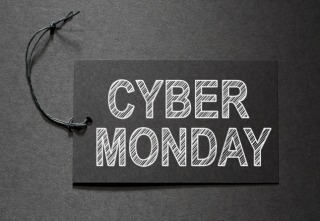 The staff and I may have taken off Black Friday, but it somehow wouldn’t be right to not offer a deal for Cyber Monday. That said, I’m all about keeping it simple. No zillion ads to scroll through, no half an hour of browsing to catch every discount. Online shopping should save time, not squander it.
The staff and I may have taken off Black Friday, but it somehow wouldn’t be right to not offer a deal for Cyber Monday. That said, I’m all about keeping it simple. No zillion ads to scroll through, no half an hour of browsing to catch every discount. Online shopping should save time, not squander it.
Today on both PrimalKitchen.com and PrimalBlueprint.com, receive $10 off any $50 purchase, and get free shipping to boot. It applies to everything there: books, desk calendars, bars, supplements, dressings, oils, mayo, collagen, and online courses. One day, one deal.
So, whether you’re looking to stock up on a favorite product, do a little holiday shopping, or try something new, today’s a good day to go for it.
For those readers interested in additional Primal-worthy, affiliate deals, let me share a couple of those, too.
Butcher Box Deal
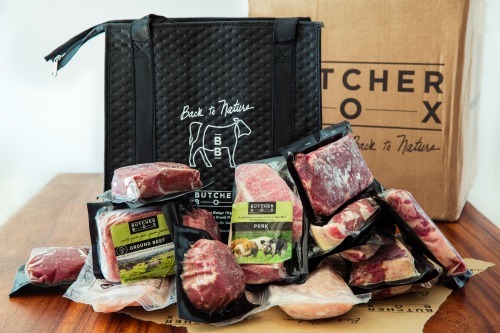 I’m a big fan of their meats (and their latest deal—a fitting one for the holidays).
I’m a big fan of their meats (and their latest deal—a fitting one for the holidays).
ButcherBox delivers the best 100% grass-fed and grass-finished beef, free-range organic chicken, and heritage breed pork directly to your door on your schedule for less than $6.00 per meal. And shipping is always free!
Sign up as a Butcher Box customer by 11/28, and choose your FREE gift added to your first order:
An Ultimate Steak Bundle (2 Rib Eyes, 2 New York Strips, 2 Filet Mignons)
—OR—
It’s your choice, and I’d say either way you’re well set for the holiday.
Dry Farm Wines
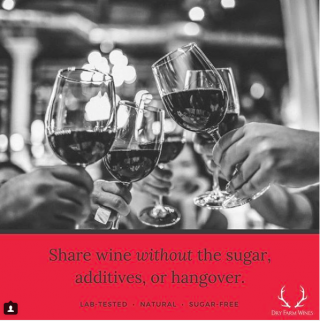 For those who are set on meat but interested in great tasting wine that doesn’t undercut their health commitment, I recommend Dry Farm Wines and serve it at my own table.
For those who are set on meat but interested in great tasting wine that doesn’t undercut their health commitment, I recommend Dry Farm Wines and serve it at my own table.
Dry Farm Wines curates only the highest quality natural wines from small, organic family farms that meet strict standards of health. Unlike today’s commercialized and processed wines, this is real wine. Nothing added, nothing removed. No additives, no sugar. Just great flavor and a perfect complement to your Primal holiday meals.
Dry Farm Wines is again offering Mark’s Daily Apple readers their popular deal of the season: a penny bottle of wine added to your order.
Just sign up here to receive your shipment of delicious, Primal-friendly wine—and your penny bottle.
Thanks, everybody. Dear Mark is coming up later this morning. Hope you all had a great holiday weekend.

The post MDA Cyber Monday Deals appeared first on Mark's Daily Apple.



November 26, 2017
Weekend Link Love — Edition 479
 Research of the Week
Research of the WeekDietary linoleic acid makes alcohol even worse for your liver.
The study results that the sugar industry suppressed—because they showed animal data indicating that sucrose increased cancer risk.
Moderate drinking appears to be protective against all-cause mortality even in Japan, where rates of suboptimal genetic ethanol metabolism are higher.
Exposure to green spaces may improve children’s ability to pay attention.
High intensity endurance training increases pain tolerance.
Access to legal cannabis reduces reliance on opioids.
New Primal Blueprint Podcasts

Episode 196: Cindy Lu and Earl Martin: Host Elle Russ chats with husband and wife team Cindy and Earl, master aromatherapists who create essential oil blends, teach workshops, and train others to use essential oils to improve their clients’ lives.
Each week, select Mark’s Daily Apple blog posts are prepared as Primal Blueprint Podcasts. Need to catch up on reading, but don’t have the time? Prefer to listen to articles while on the go? Check out the new blog post podcasts below, and subscribe to the Primal Blueprint Podcast here so you never miss an episode.
Interesting Blog Posts
There isn’t much evidence that “finish the antibiotics course” prevents antibiotic resistance or improves outcomes. Nevertheless, the mantra persists.
Media, Schmedia
The sugar industry has been stifling research into sugar’s effects on health for decades.
A famous (or now infamous?) food scientist has retracted yet another paper, his fourth this year.
Everything Else
Carl Lewis doesn’t think kids should specialize in specific sports.
People are already using CRISPR to edit their own genes. No one can stop them, so let’s just sit back and hope the inevitable cyberpunk futurescape isn’t completely dystopian.
Are introverts selling themselves short?
Things I’m Up to and Interested In
Giveaway I’m excited to, well, give away: The Primal Kitchen® Instant Pot giveaway. Go through Facebook or Instagram for your chance to win.
Charity event I’m participating in: One of my favorite charities is GO Campaign, which improves the lives of orphans and vulnerable children around the world by partnering with local heroes to deliver local solutions. I got “auctioned off” last year and had a blast paddling with the winner. I’m up for grabs again this year….
Podcast I enjoyed doing: The mindbodygreen Podcast, where I explained exactly how long you need to be keto.
I know what my next supplement will be: Beneficial viruses protect our cells from pathogenic bacterial invaders.
Opinion I agree with: Analog is back (though digital is here to stay, too).
Recipe Corner
Best roasted sweet potatoes, though I don’t think the honey is necessary.
Pumpkin pie, shmumpkin pie. Try this savory pumpkin soup.
Time Capsule
One year ago (Nov 26– Dec 2)
How to Feed, Train, and Care For Your Cartilage – Don’t neglect your connective tissue.
My 8 Favorite International Dishes to Expand Your Primal Palate – Try your hand and mouth at these recipes.
Comment of the Week
“Did my Black Friday shopping in the forest. It was a great time, just being quiet and listening to the wind in the evergreens, but no suitable deer wandered in range. Next time, I guess.”
– Sounds like a good one, His Dudeness.

The post Weekend Link Love — Edition 479 appeared first on Mark's Daily Apple.



Mark Sisson's Blog
- Mark Sisson's profile
- 199 followers


